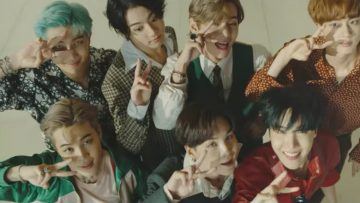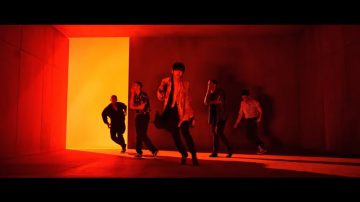by Brooks Riley
 On January 28th of this year, just as the biggest black swan event of the century was about to unfold, the South Korean band BTS debuted their latest single Black Swan on CBS’s Late Late Show. Looking back on this moment of Jungian synchronicity, one might be tempted to ask, ‘How did they know?’
On January 28th of this year, just as the biggest black swan event of the century was about to unfold, the South Korean band BTS debuted their latest single Black Swan on CBS’s Late Late Show. Looking back on this moment of Jungian synchronicity, one might be tempted to ask, ‘How did they know?’
Then in February, when the Tonight Show featured BTS performing their song ON in the deserted main concourse of New York’s Grand Central Station, the rare sight of that vaulted Beaux Arts architecture devoid of travelers seemed also vaguely ominous. Weeks later, an empty Grand Central was no longer the wee-hours venue rented out to a TV show. It was a daytime reality, thanks to a pandemic which shut the city down.
Like many fellow Koreans BTS believes in fate. They seem to gravitate to moments that are portentous and credit at least some of their massive success to fated good fortune—notwithstanding hard work, innate talent, good management, and the support of an abiding Army of fans.
Those early omens were not the only brush the band would have with the sober realities of 2020. The massive demonstrations for Black Lives Matter in June after the death of George Floyd prompted BTS to donate $1 million to BLM, an amount spontaneously matched by their Army of fans the next day, donations that may have influenced more Americans into giving as well.
This summer, Stay Gold, a sunny, upbeat plea to keep dreams alive, complete with golden retriever and technicolor landscape, was the perfect fit for a pandemic playlist. And a simple PSA about social distancing funded by Hyundai made staying at home as glamorous—or not—as they are, sending the essential message that no one, not even stars in the pop culture firmament, are exempt from the challenges that a lockdown imposes.
 In August, when the eponymous Dynamite blew up YouTube with two versions, the original MV and a novel, so-called B-side, the impact of this infectious throwback to ‘80s disco pop was immediate, smashing records right and left, but more importantly, infusing the protracted gloom of Summer 2020 with a blast from the past of pure joy. A glance at YouTube reaction videos to BTS’s first all-English release confirms the instant rapport this song has established with all listeners, BTS first-timers and Army alike. It soared to the top of the Billboard singles chart, another first for the band, after they performed it live (from Seoul) at the VMA awards last week.
In August, when the eponymous Dynamite blew up YouTube with two versions, the original MV and a novel, so-called B-side, the impact of this infectious throwback to ‘80s disco pop was immediate, smashing records right and left, but more importantly, infusing the protracted gloom of Summer 2020 with a blast from the past of pure joy. A glance at YouTube reaction videos to BTS’s first all-English release confirms the instant rapport this song has established with all listeners, BTS first-timers and Army alike. It soared to the top of the Billboard singles chart, another first for the band, after they performed it live (from Seoul) at the VMA awards last week.
Dynamite invokes happier times and delivers a quintessentially classic American retro sound. But don’t be fooled by the mainstream simplicity of this catchy one-off, written by a British duo. BTS are as acquainted with darkness and murky subjects as they are with light and the light-hearted. They may have hit the jackpot now, but their quintessence lies elsewhere, in the evolving combinations of sounds, rhythms, styles, themes and moods that keep them pushing the envelope.
***
The first boy band I ever saw was the Beatles, at Carnegie Hall in 1964. They hadn’t done their best work yet, but I liked their music enough to want to hear them live. As it turned out, I never heard a thing. The entire concert was a non-stop chorus of primal screaming by teenage girls, who clearly had no intention of actually listening to the Beatles or letting anyone else listen. They were there to vent their paltry, high-decibel ecstasy at being close enough to see the fab four pixels from Liverpool and breathe the same stale air.
Boy bands as bookends to a life devoted to classical music? At this end, it’s not four, but seven fab guys from South Korea who have lured me away from the hallowed works of beloved dead composers like Schubert or Scriabin. Was it my year-long virtual residency in South Korea via Hallyu, or were they simply too much fun to resist? Is this my second adolescence?
Unlike the Beatles, BTS can rap the paint off walls (three of the seven are rappers). And they can really move. Dancing at that level takes years of training to look so smooth and effortless. (Learning their moves in front of a mirror is now my favorite lockdown pastime.) Even if I’m not able to see them live, I can get closer, without the Dionysian frenzy of adolescent adoration to mar the experience. In that respect, YouTube is better than Carnegie Hall.
To call BTS a boy band is no less insulting than calling the Beatles a boy band, with those hints of arrested development, rites of passage yet to come, or worse, canned commercial entertainment. On the contrary, BTS has laid bare the inevitable identity crises that occur when seven distinct personalities are lumped into one entity. More to the point, they have incorporated those growing pains into their music, relying on Murray Stein’s book Jung’s Map of the Soul to explore aspects of their psyches and their personal struggles. One need only read these song titles—Singularity, Jamais vu, Inner Child, Persona, Ego, Shadow—to know what’s going on beneath the shimmering patina of nonchalance and rollicking stardom. The BTS campaigns for self-awareness and self-empowerment have made it a superpower among influencers.
In a way, BTS is a successful social experiment. Thrown together in their formative teenage years, living in cramped quarters and struggling through hard times, these seven performers have evolved into a social organism that functions both as a hydra—no one member surviving without the others—but also as a brotherhood of stand-alone, sing-alone individuals who actually seem to like each other.
This may be the genius of impresario Bang Si-hyuk, founder and CEO of Big Hit Entertainment, the company who formed the band in 2010 and nourished their development. A songwriter who studied philosophy in university, Bang seems to know how to bring out the best in his artists. He’s even collaborated with them as “Hitman” Bang, co-writing songs like Blood, Sweat and Tears, Fake Love, or Mic Drop. And he’s let them spread their wings (a frequent meme in their videos) as solo artists. It’s difficult to imagine any American group being formed this way, but the results have been dazzling.
As a label, Big Hit oozes Apple vibes. Even their low-key white-on-white opening logo lends an aura of good taste and high quality. The producing teams are impeccable and at the same time dynamic and innovative—from the video directors and editors, to the choreographers and stylists and sound producers. Big Hit is on the verge of an IPO, an acknowledgement of its well-deserved rapid rise in the music world.
Up to now, BTS’s refusal to release an all-English song is probably what kept it from reaching the top of singles charts, which are largely determined by radio play. That the band made an exception for Dynamite has more to do with the sudden opportunity to comfort fans during the pandemic from a demo they all liked, than a policy change. Their own eclectic oeuvre, a whole jukebox of genres, delves into Korean topics as well as psychological, philosophical and aesthetic issues, and is darker, more sophisticated, and more challenging than this feel-good moment right now. Their refusal to pander to easy listening for xenoglossophobes suggests that BTS wants their listeners to meet them halfway. There are enough English phrases and key words in all of BTS’s work to tickle the ears and intrigue the mind. And with subtitles that are easy to read, there’s really no reason to resist.
The band’s popularity has been chipping away at American xenophobia. With Dynamite, whole blocks of it fell away overnight. But whether or not Americans will come to love the sheer rhythmic glory of Suga’s rap in Daechwita without understanding the words remains to be seen. BTS’s phenomenal success means that America’s cultural hegemony is slipping, like a tectonic plate gone awry. It’s about time. Globalization should mean give and take between cultures, not domination of one over another.
Jin, Jimin, RM, J-hope, Suga, V, and Jungkook all know more than we do about social distancing: It could be said that they’ve been in a kind of permanent lockdown since 2010, when they were selected as trainees for an eventual boy band. That gilded isolation raises many questions about the pressures, sacrifices and demands that accompany pop success. For that reason, the BTS oeuvre has often been anything but sunny. Still, as talents capable of commanding any genre, or setting any mood, they continue to interact with their fans, sending powerful musical messages that feel very real.
If BTS appeared to be harbingers of doom as the year began, they’ve more than made up for it with the positive reverb of the life-affirming Dynamite. That may just be enough to get us through the rest of this sorry year.
Dynamite: Here, here and here.
Additional BTS highlights:
Singularity A slow jazzy burn sung by V. Brilliant visuals.
Black Swan The official music video. Check out those Jungian shadows at the beginning and end.
Blood, Sweat and Tears Hesse meets Nietzsche meets Bruegel. Gorgeous.
Mic Drop Dystopian fury,
Jamais vu Melodious misery
Fake Love Extravagant.
If subtitles on these videos don’t appear automatically, you may have to turn them on manually.
